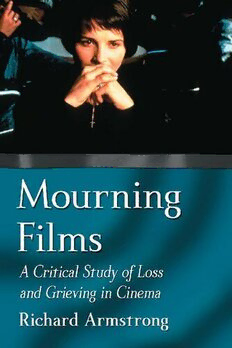
Mourning Films: A Critical Study of Loss and Grieving in Cinema PDF
Preview Mourning Films: A Critical Study of Loss and Grieving in Cinema
Mourning Films ALSO BY RICHARD ARMSTRONG Billy Wilder, American Film Realist (McFarland, 2000; paperback 2004) Mourning Films A Critical Study of Loss and Grieving in Cinema R A ICHARD RMSTRONG McFarland & Company, Inc., Publishers Jefferson, North Carolina, and London LIBRARYOFCONGRESSCATALOGUING-IN-PUBLICATIONDATA Armstrong, Richard, 1959– Mourning films : a critical study of loss and grieving in cinema / Richard Armstrong. p. cm. Includes bibliographical references and index. ISBN 978-0-7864-6699-3 softcover : acid free paper 1. Loss (Psychology) in motion pictures. 2. Grief in motion pictures. 3. Psychic trauma in motion pictures. 4. Bereavement—P sychological aspects. I. Title. PN1995.9.L59A75 2012 791.43'6165—dc23 2012029422 BRITISHLIBRARYCATALOGUINGDATAAREAVAILABLE © 2012 Richard Armstrong. All rights reserved No part of this book may be reproduced or transmitted in any form or by any means, electronic or mechanical, i ncluding photocopying or recording, or by any information storage and retrieval system, without p ermission in writing from the publisher. On the cover: Juliette Binoche in Three Colors: Blue (1993 France) aka Trois couleurs: Bleu(Miramax/Photofest) Manufactured in the United States of America McFarland & Company, Inc., Publishers Box 611, Jefferson, North Carolina 28640 www.mcfarlandpub.com For my sister This page intentionally left blank Contents Preface 1 Introduction 7 Chapter 1. Manifestation 37 Chapter 2. Realization 67 Chapter 3. Acceptance 108 Chapter 4. Release 155 Conclusion 193 Bibliography 197 Index 205 vii This page intentionally left blank Preface This is a book about the representation and aesthetics of loss and mourn- ing in modern cinema. It is important to stress at the outset that this is not a book about the representation of death in films, but about the representation of the emotional and psychological consequences of death. There have been numerous treatments of death in film books, just as there have been numerous deaths represented in films. But until very recently, the treatment of loss and the films which treat loss and its consequences have been significantly over- looked in cinema scholarship. This is a gap which I hope this book goes some way towards filling. Significantly, while the theme of loss finds the aesthetics of a film address- ing an experience which is very real and very quotidian for many people, and will be very real for everyone in due course, it is also intrinsic to what cinema is as an apparatus. Put simply, the cinema is a space in which we see someone who is no longer there. In its very mechanism, in the furious alternation between presence and absence as the images and their frames rush over the projector beam, cinema technically embodies the play of presence and absence as states, and in consequence of this flicker of presence and absence we gaze up at, and typically adore, a figure who once stood before a camera, perhaps many years ago, yet is now nowhere to be found. By this light, the term “medium,” used both to describe the organizing figure at a spiritualist séance, and a mode of aesthetic representation such as film, seems especially apt. The cinema both embodies loss and mediates those whom we have lost, whether they are a dead film star or the deceased relative in a home movie. The aesthetics of loss, therefore, are essential to film history because, literally and figuratively, they chime with what film is, arguably a necropolis of dead souls. Meanwhile, in addressing the consequences of death, what I am calling the “mourning film,” that film in which the drama revolves around a loss grieved over, looks beyond the cinema’s myriad spectacles of death at the feelings death engenders in the living, and by ghastly implication, the prospect of mine and your own finitude, 1
